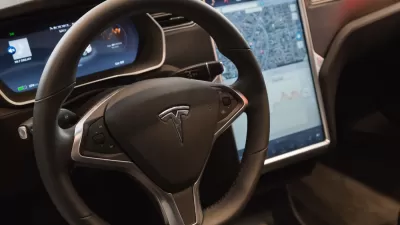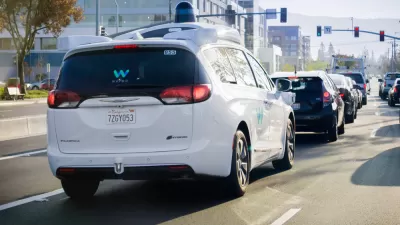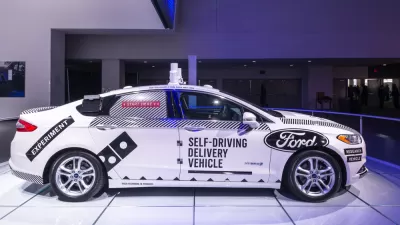A new report from Urbanism Next/SCI takes you through a city’s budget—both revenues and expenditures—and describes the areas that will be affected as AVs become commonplace and e-commerce takes on an even larger role in retail

Could autonomous vehicles and E-commerce cause an economic disaster for government? Knowing about the possible impacts of technological disruption can help government prepare.
In July 2017, Urbanism Next, a research project sponsored by the Sustainable Cities Initiative, explored one of the secondary effects of AVs and e-commerce on communities—the impacts on local government budgeting and finance.
The resulting report, ‘The Impact of AVs and E-Commerce on Local Government Budgeting and Finance’, surveys a city’s budget—both revenues and expenditures—and starts to think about what could happen as AVs become common and e-commerce takes on an even larger role in retail. City leaders have to start planning for this future now if they want to have a voice in what AVs and e-commerce will do to their cities. AVs create a “potential rat’s nest of a budgeting challenge.” This report seeks to begin the process of untangling that rat’s nest, and provide the foundation for future phases of the project that will consider potential additional revenue sources to fund the infrastructure changes that may come from the integration of AVs and more widespread e-commerce.
Consider that AVs will be on the roads in substantial numbers within the next 10 years, and taking on a substantial share of transportation needs in 20 (or less). Uber didn’t exist before 2009, but by 2017 nearly 10% of people who sold their cars last year are doing it because they just use Uber and Lyft instead. As the technology gets simpler and pricing goes down, more and more people will find alternative ways to getting around than owning their own car.
E-commerce promises to be equally disruptive to retail. When Amazon started in the 1990s, no one could have imagined that the online bookstore would transform into one of the world’s largest companies. Now, about half of all American households have an Amazon Prime account and brick and mortar stores across the country are struggling to compete. More stores are closing today than during the Great Recession, emptying out commercial corridors and shopping malls.
The combination of e-commerce and AVs will (and may already be) reshaping our cities and this transformation will affect everyone. Many cities have large investments in on-street parking and parking garages built with bonds to be repaid by future parking revenue. However, that revenue might not materialize as more and more people use ridesharing and AV services instead of their own cars. Already, airports have seen a substantial drop off in parking revenue, taxi revenues, and rental car revenues because of the increase in ridesharing services.
The report explores the impacts of technology on a range of taxes, including property, business, and sales use taxes, as well as fee for service. It also raises a number of equity issues, considering that many jobs, such as bus drivers, parking enforcement, and court personnel that handle traffic citations may shed jobs as they are replaced by AVs or there is less demand because of a lack of parking and enforcement of traffic laws.
Read the full report here.
FULL STORY: The Impact of AVs and E-Commerce on Local Government Budgeting and Finance

Alabama: Trump Terminates Settlements for Black Communities Harmed By Raw Sewage
Trump deemed the landmark civil rights agreement “illegal DEI and environmental justice policy.”

Study: Maui’s Plan to Convert Vacation Rentals to Long-Term Housing Could Cause Nearly $1 Billion Economic Loss
The plan would reduce visitor accommodation by 25% resulting in 1,900 jobs lost.

Planetizen Federal Action Tracker
A weekly monitor of how Trump’s orders and actions are impacting planners and planning in America.

Wind Energy on the Rise Despite Federal Policy Reversal
The Trump administration is revoking federal support for renewable energy, but demand for new projects continues unabated.

Passengers Flock to Caltrain After Electrification
The new electric trains are running faster and more reliably, leading to strong ridership growth on the Bay Area rail system.

Texas Churches Rally Behind ‘Yes in God’s Back Yard’ Legislation
Religious leaders want the state to reduce zoning regulations to streamline leasing church-owned land to housing developers.
Urban Design for Planners 1: Software Tools
This six-course series explores essential urban design concepts using open source software and equips planners with the tools they need to participate fully in the urban design process.
Planning for Universal Design
Learn the tools for implementing Universal Design in planning regulations.
Caltrans
Smith Gee Studio
Institute for Housing and Urban Development Studies (IHS)
City of Grandview
Harvard GSD Executive Education
Toledo-Lucas County Plan Commissions
Salt Lake City
NYU Wagner Graduate School of Public Service





























